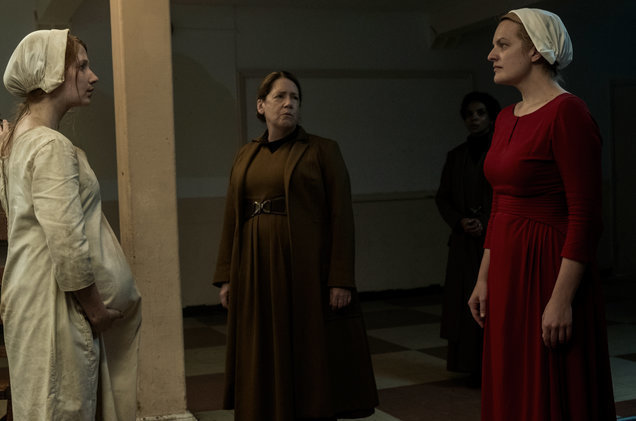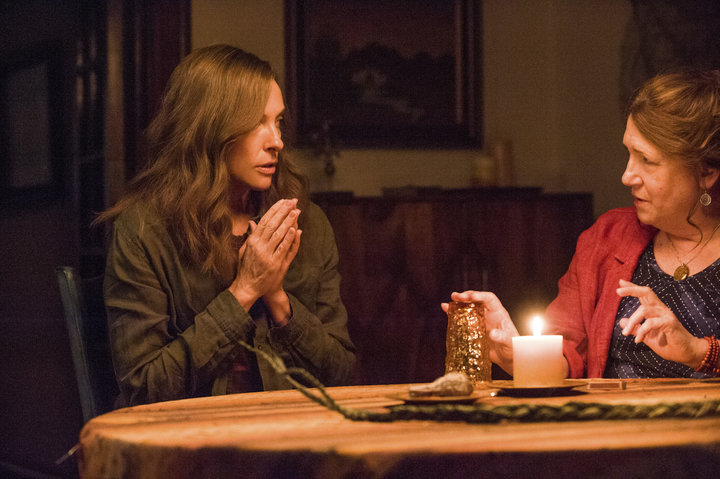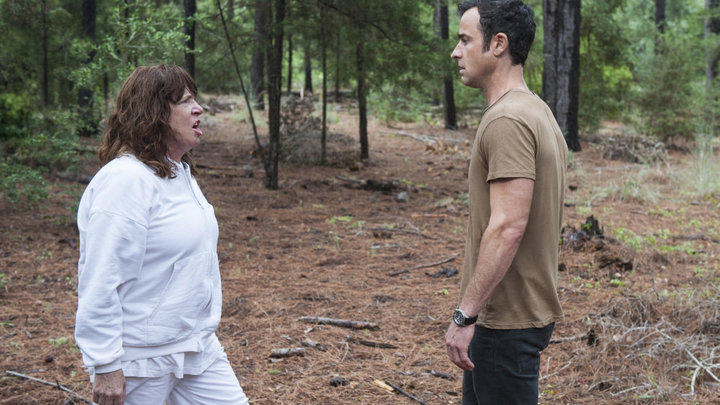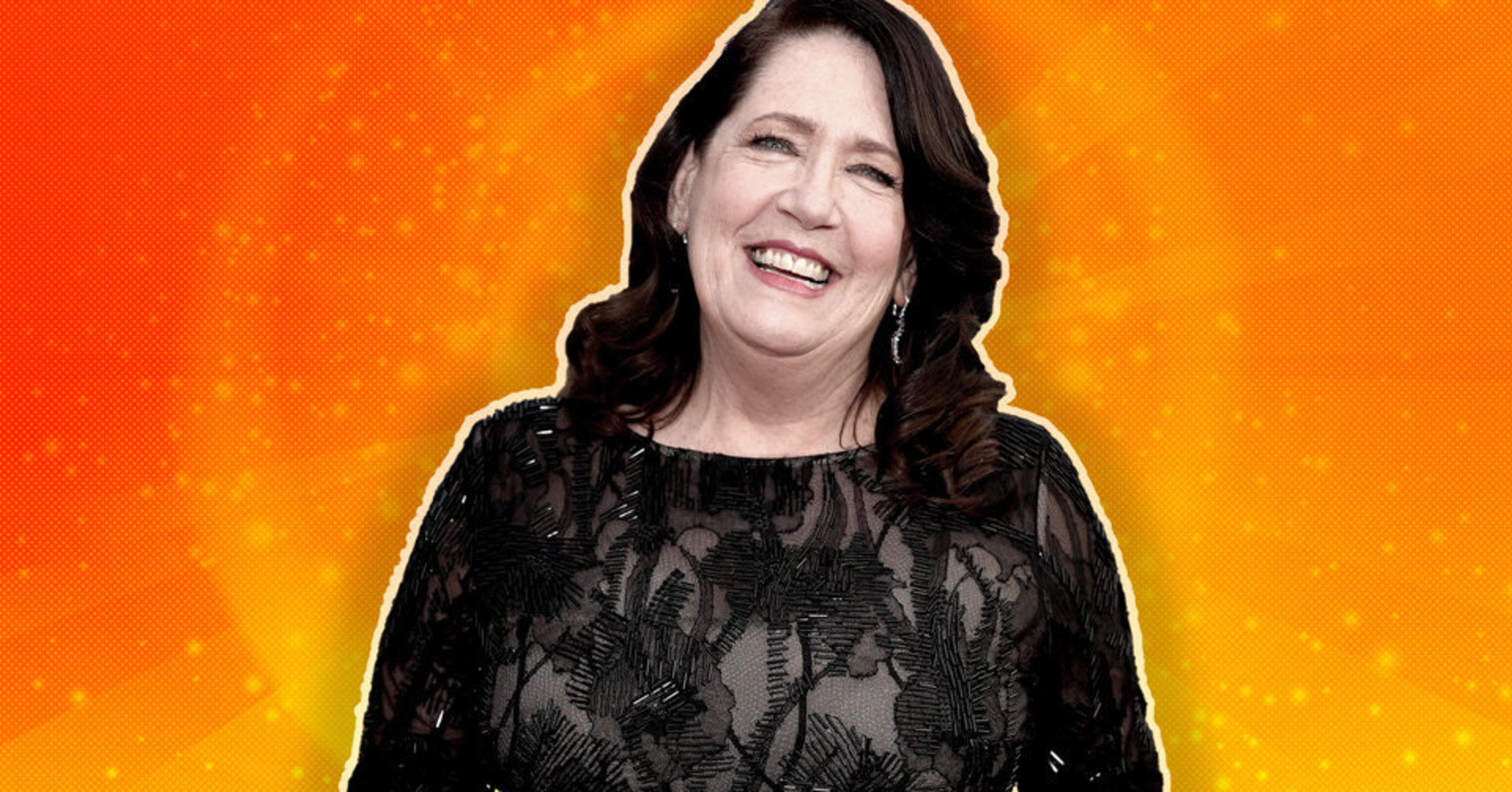[ad_1]
For approximately 80 minutes on a sweltering New York morning, Ann Dowd held my hand. It was tentative at first, intermittent. A graze here or there. But by the time our conversation at a coffee shop near her Manhattan apartment was drawing to a close, she was hooking a finger into the cuff of my sleeve and burrowing her eyes into mine.
The gestures matched the tenor of her speech. Dowd, a stage veteran, talks like a playwright with a habit of slipping into her characters’ inflections. I found myself backing away in my chair when she adopted the thin stentorian cadence of Aunt Lydia, her terrifying matron in “The Handmaid’s Tale,” for which she recently earned her third Emmy nomination. In transcribing the interview later, I realized it’s hard to quote Dowd verbatim, if only because her abstractions don’t read as fluidly on paper as they sound in person. She may be one of this decade’s most beloved breakout stars, but Dowd is still a theater intellectual at heart.
She became a celebrity at the improbable age of 56, when her electrifying performance as a fast-food manager in the taut thriller “Compliance” earned Oscar buzz. Since then, Dowd has been in, well, everything, including a barb about Sarah Huckabee Sanders at the most recent White House Correspondents’ Dinner. This summer alone, she appeared in a trio of Sundance indies (“Hereditary,” “American Animals,” “A Kid Like Jake”) and filmed a limited series in Australia called “Lambs of God,” in which she plays a nun. If there’s one thing Dowd feels about her sudden success, it’s gratitude.
Here are excerpted highlights from our conversation, lightly edited.
On seeing the morbid opening of “The Handmaid’s Tale” Season 2 for the first time:
With “Handmaid’s,” that first episode and that terrifying opening scene, we actually shot weeks and weeks later because it required a location that took time to find and then secure. And when we shot it, it was an all-nighter, so at 5 a.m. I’m crossing the mound to go to my girls, all very present.
So leave that and jump ahead to the premiere in Los Angeles, which is way after we completed our season. I was filming something at the time in Ventura, so I did the press day and then I did the red carpet, and then we all came onstage and they were going to show the first episode. I had a car waiting to go back because I literally had to go and film so early the next morning. So I said, “I just want to see the opening scene.”
It floored me, as though I had never seen it or heard it or read it. I was literally physically affected by it, and I kind of stumbled to the car and thought, oh my god. When you’re working on something else, it’s so easy to be influenced by material and so I just had to keep it at bay. I thought, there’ll be a time when I can sit and watch this with focus and not be afraid of how it’ll affect me.

Hulu
On the one thing Lydia would take back:
I think, for instance, that with sweet Janine, if Lydia had to do it over, she wouldn’t take the eye because the girl can’t handle it. She is the definition of fragile. Just because she said “fuck” twice? That went too far. She could have done with some tasing, and then she would have snapped too.
Because in the first season, we went to the big delegation from Mexico to show all the handmaids. Serena Joy says, “Pull out the damaged ones.” And Lydia says, “Wait a minute. They’re just as devoted. What do you mean remove them?” So clearly she has a different sensibility about what we’re doing here.
The fact that she loves them is going to be the downfall because, when you love someone like she does, then the walls begin to crumble and whatever attachment you have to this narrow way of life is going to be potholes, and you’re going to have a chance to see a bigger world.
On goading Alexis Bledel to push her harder in the Season 2 finale:
Sweet Alexis is a shy, sweet, private individual. I’d say, “Babe, give me a shove.” And she’d say, “Did that hurt?” She’s delicious. “Honey, you know what? I’m four times your size, just go like this.” She’s a doll.
On the moment she realized she didn’t like watching her own work:
One time I did a part I loved on television, and it was for the series [“Family Law”]. It was before cable really took off, and so there were commercials. It dawned on me as I was filming it that the character lived in the silences between responses. There’s where she was really herself. She was a developmentally challenged person. I couldn’t wait to see it. This was early in my career. I watched it and they took out all the silences, of course, because it’s a television show. This isn’t a silent movie about my character. I was disappointed in the result because I thought, “Oh, the character’s not even there.” She was present, but the meaning of her for me wasn’t ― and I thought, “Oh.” I have no control over that. It’s in others’ hands, as it should be: director, editor. But I thought, “Be careful. Don’t place value in what you have no control over.”

A24
On shooting the final scene of “Hereditary,” where she delivers a devilish incantation:
When I first came, I thought, “Oh my god, how will I do this?” And so I sang it in what I hoped would be like a Gregorian chant. It was effective. I loved it. And sweet Alex Wolff loved it too. And [director Ari Aster] let me do it a few times and he filmed it, but it didn’t work with his vision, so it didn’t happen. But it was fascinating to look at it from different ways and think, “How can we get this done?” Have you ever listened to a Gregorian chant? It’s kind of beautiful and hypnotic.
On almost not doing “Hereditary”:
I was raised Catholic, and when I saw “The Exorcist,” it scared me for years. I said to Ari, “Hey, am I going to get possessed?” He said, “No, you’re not.” Because I was literally thinking full-out devotion to Paimon. I wasn’t going to do it because it was a horror movie and it scared me. But the problem with wonderful directors like Ari is the minute you start talking to them, you’re like, “Oh, I’m definitely doing it.”
On watching her American projects premiere all the way from Australia:
You can’t imagine how small the world is. Literally, the number of people who said, “You’re not ― are you ― you’re not in ‘The Handmaid’s Tale’?” It’s a huge thing there. Horror movies! Who knew? “Hereditary” was massive there. So I did feel it. “American Animals” had a premiere in Sydney, which I missed. I don’t know how I missed it ― I was sitting in my apartment, and I love the director, Bart Layton.
I hope to get over this ― though I don’t know when that will be ― but I’m terrified to see the things once they’re up and running. And it’s not so much that you’re going to judge the performance ― if I’m not over that by now, that’s pathetic. Like, honey, come on, did you do the best you could? Just relax. It’s more the enormity of the experience of doing. I can’t explain. It’s very powerful, and then the thought of going and watching it, I don’t know how to combine the two.
On why “The Leftovers” wasn’t a bigger hit:
It’s because Damon Lindelof and Tom Perrotta are asking us to do something that we by nature flee from, which is to sit with grief and to sit with loss and not run and to realize it is not a linear process and it takes the form and time it needs to take for each and every one of us. They opened up those freeways. It’s such a tremendous gift. I want to say, “Darlings, just sit with it a little bit longer and you’ll be able to do it.” It’s like when you teach your children, “Don’t flee from feeling, honey. It’s gonna hurt at first and you’ll think it’s gonna swallow you, but in fact what it’s going to do is liberate you. It’s going to allow you to grow.” It’s going to allow you to say, “I can live with this.” It’s huge! But you can’t force people. And people often go to a show to get away from what’s troubling them.

HBO
On earning the sole Emmy nomination for “The Leftovers”:
That I could be so fortunate at this stage of my life, I don’t know how to express the gratitude that one feels. I remember thinking as I was sitting there, out of everyone that works in their lives, many work much harder than I do ― the majority. Just on the last [project], “Lambs of God,” there was a worker who did all of the trailers. He’s there way before we are. They’re heated, they’re vacuumed. He has to move them. I looked at him and I thought, “I don’t have the words. What is he being paid?” And so back to the Emmy, that flash of, “If everyone could have just a moment when someone says, ‘Come here for a second. Would you stand here and I’m going to give you a nice suit or a pretty dress, and I’m going to say, good for you and here’s a thing to take home.’” It goes a long, long way. So yes, I’ve worked hard in my career, in the sense that I have stayed devoted to the love story I have for this work. That’s my job, to keep it alive. But I’m mind-blown. And if I ever forget that, shame on me.
On what Sister Aloysius Beauvier, the main character in “Doubt,” later taught her about “Compliance” and “The Handmaid’s Tale”:
I had the privilege of playing that role onstage and realizing so many things, one of which is, her life begins at the end when she has doubt. It cracks open when she thinks, “Oh, wait a minute, I think I did the wrong thing.” That never happened to Sandra in “Compliance.” Because if you are complicit in something that derails human lives, you’ve got to have a breakdown. You’ve got to put it all down and your life has to fall apart so you can say, “Wait a minute. Who am I? How could this have happened on my watch?” That’s when life could begin again, like “Doubt.” But Sandra does the opposite. She says, “But you’d have done the same thing. If I had to do it over, I’d do the same and so would you.” She was blind to what was happening in front of her. So what will happen with Lydia? I think she deeply believes what she is doing is the right thing. And she’s not taking any advantage of the system because she’s a headhunter.
On the one role she most wants to play:
Joan of Arc, by [George Bernard] Shaw. There was a British dame ― I forget her name ― who said you can only be too young to play Joan. So I haven’t given up yet. What a challenge. Have you read it recently? Brilliant. I played Joan in “The Lark” ― also very good, but it’s not Shaw.
[ad_2]
Source link

